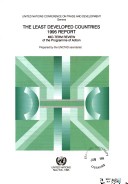Least Developed Countries
3 total works
The Least Developed Countries
by United Nations: Conference on Trade and Development
Published 30 June 1987
At the end of the 1990s, it has become clear that the least developed countries (LDCs) have generally failed to derive appropriate benefits from the ongoing processes of liberalization and globalization. The grim reality of violence and social tensions which afflict several LDCs raises three important questions that need to be addressed as a matter of priority: why have past efforts to address the development problems of LDCs failed to deliver the desired results?; what are the critical factors that continue to depress living standards and constrain the participation of LDCs in world trade?; and how can such constraints be overcome, thereby restoring hope in the new century? An examination of these issues in this report reveals that underlying the LDCs poor performance in world trade is their weak productive capacity and competitiveness, resulting from structural and supply-side constraints, namely economic structure and unspecialized firms, among others.
The Least Developed Countries 1992 Report
by United Nations: Conference on Trade and Development
Published 31 December 1993
The Least Developed Countries 1995 Report
by United Nations: Conference on Trade and Development
Published 1 January 1995

